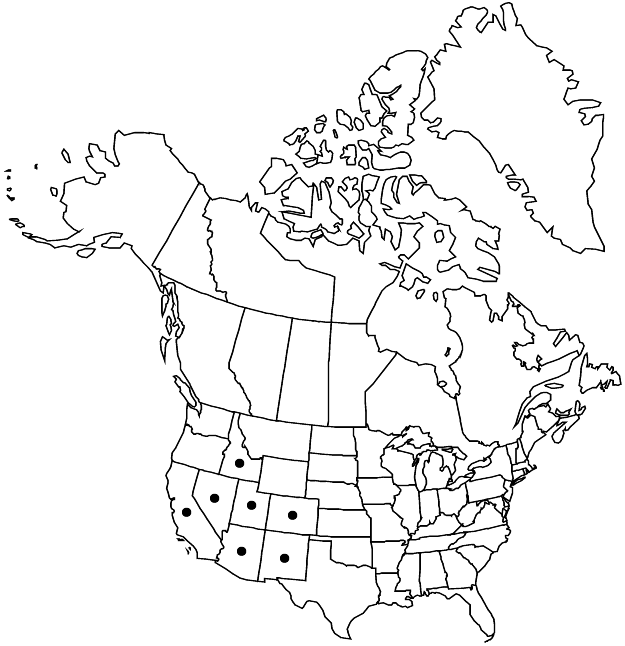Difference between revisions of "Eriogonum palmerianum"
in P. A. Munz, Suppl. Calif. Fl., 58. 1968.
FNA>Volume Importer |
FNA>Volume Importer |
||
| Line 27: | Line 27: | ||
|elevation=(300-)600-2300(-2700) m | |elevation=(300-)600-2300(-2700) m | ||
|distribution=Ariz.;Calif.;Colo.;Idaho;Nev.;N.Mex.;Utah. | |distribution=Ariz.;Calif.;Colo.;Idaho;Nev.;N.Mex.;Utah. | ||
| − | |discussion=<p>Eriogonum palmerianum is common and widespread, sometimes becoming locally abundant and even weedy. It is found in the southern Great Basin and Mojave deserts of eastern California eastward through Nevada, southwestern Idaho, and Utah, on to the Colorado Plateau of western Colorado. In Arizona and New Mexico, it occurs mainly in the Sonoran Desert. Occasional collections are difficult to distinguish from E. nidularium, but such confusion usually is not encountered in the field.</p> | + | |discussion=<p><i>Eriogonum palmerianum</i> is common and widespread, sometimes becoming locally abundant and even weedy. It is found in the southern Great Basin and Mojave deserts of eastern California eastward through <i>Nevada</i>, southwestern Idaho, and Utah, on to the Colorado Plateau of western Colorado. In Arizona and New Mexico, it occurs mainly in the Sonoran Desert. Occasional collections are difficult to distinguish from <i>E. nidularium</i>, but such confusion usually is not encountered in the field.</p> |
|tables= | |tables= | ||
|references= | |references= | ||
| Line 51: | Line 51: | ||
|publication year=1968 | |publication year=1968 | ||
|special status= | |special status= | ||
| − | |source xml=https://jpend@bitbucket.org/aafc-mbb/fna-data-curation.git/src/ | + | |source xml=https://jpend@bitbucket.org/aafc-mbb/fna-data-curation.git/src/8f726806613d60c220dc4493de13607dd3150896/coarse_grained_fna_xml/V5/V5_892.xml |
|subfamily=Polygonaceae subfam. Eriogonoideae | |subfamily=Polygonaceae subfam. Eriogonoideae | ||
|genus=Eriogonum | |genus=Eriogonum | ||
Revision as of 18:41, 18 September 2019
Herbs, spreading to erect, (0.5–)1–3 dm, mostly floccose to tomentose, grayish to tawy. Stems: aerial flowering stems mostly erect, 0.3–0.8 dm, floccose to tomentose. Leaves basal; petiole 1–4 cm, floccose; blade suborbiculate to cordate, 0.5–1.5(–1.8) × 0.5–2 cm, densely white- to grayish-tomentose abaxially, less so to glabrate and often greenish adaxially. Inflorescences cymose, distally uniparous due to suppression of secondary branches, open, 5–2.5 × 10–30 cm; branches not inwardly curved distally, floccose to tomentose; bracts 0.5–3 × 1–3 mm. Peduncles absent. Involucres appressed to branches, campanulate, 1.5–2 × 1.5–2 mm, floccose to tomentose; teeth 5, erect, 0.2–0.3 mm. Flowers 1.5–2 mm; perianth white to pink or pale yellowish, becoming pink to red, glabrous; tepals dimorphic, those of outer whorl narrowly fan-shaped, those of inner whorl oblanceolate; stamens included, 1–1.5 mm; filaments pilose proximally. Achenes brown, 3-gonous, 1.5–1.8 mm. 2n = 40.
Phenology: Flowering Mar–Oct.
Habitat: Sandy to gravelly washes, flats, and slopes, saltbush, greasewood, creosote bush, blackbrush, and sagebrush communities, pinyon and/or juniper woodlands
Elevation: (300-)600-2300(-2700) m
Distribution

Ariz., Calif., Colo., Idaho, Nev., N.Mex., Utah.
Discussion
Eriogonum palmerianum is common and widespread, sometimes becoming locally abundant and even weedy. It is found in the southern Great Basin and Mojave deserts of eastern California eastward through Nevada, southwestern Idaho, and Utah, on to the Colorado Plateau of western Colorado. In Arizona and New Mexico, it occurs mainly in the Sonoran Desert. Occasional collections are difficult to distinguish from E. nidularium, but such confusion usually is not encountered in the field.
Selected References
None.